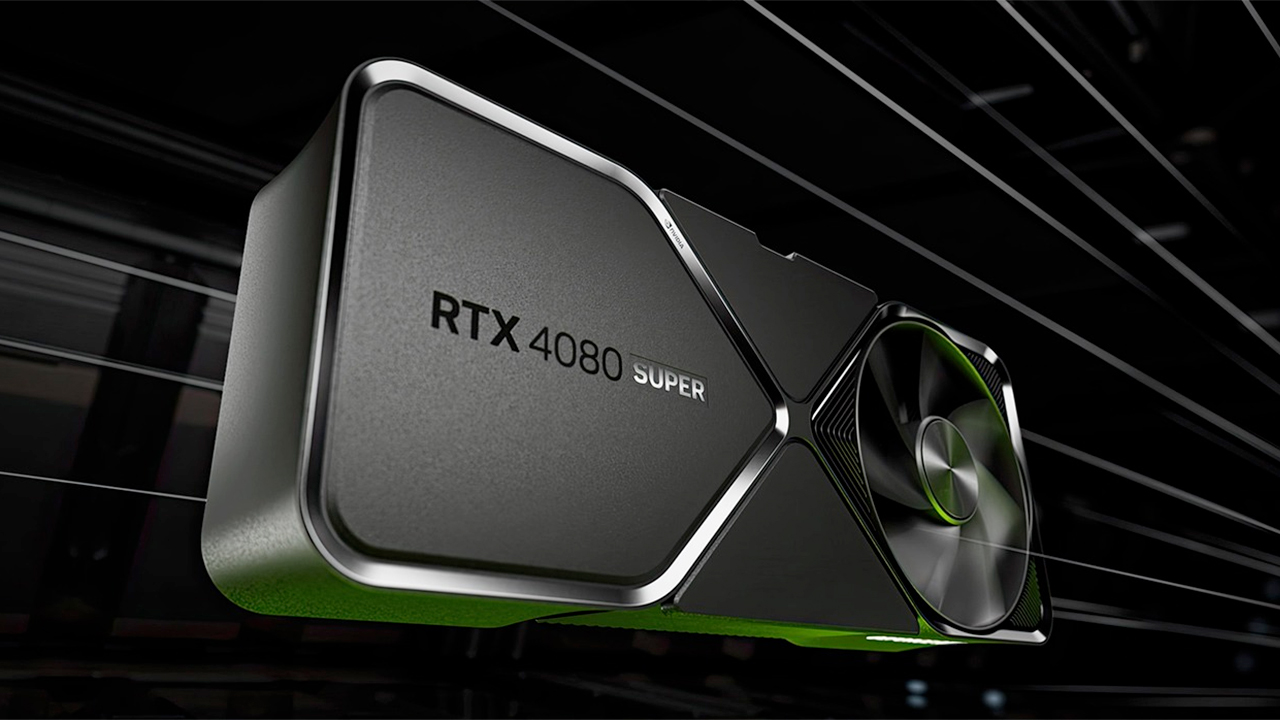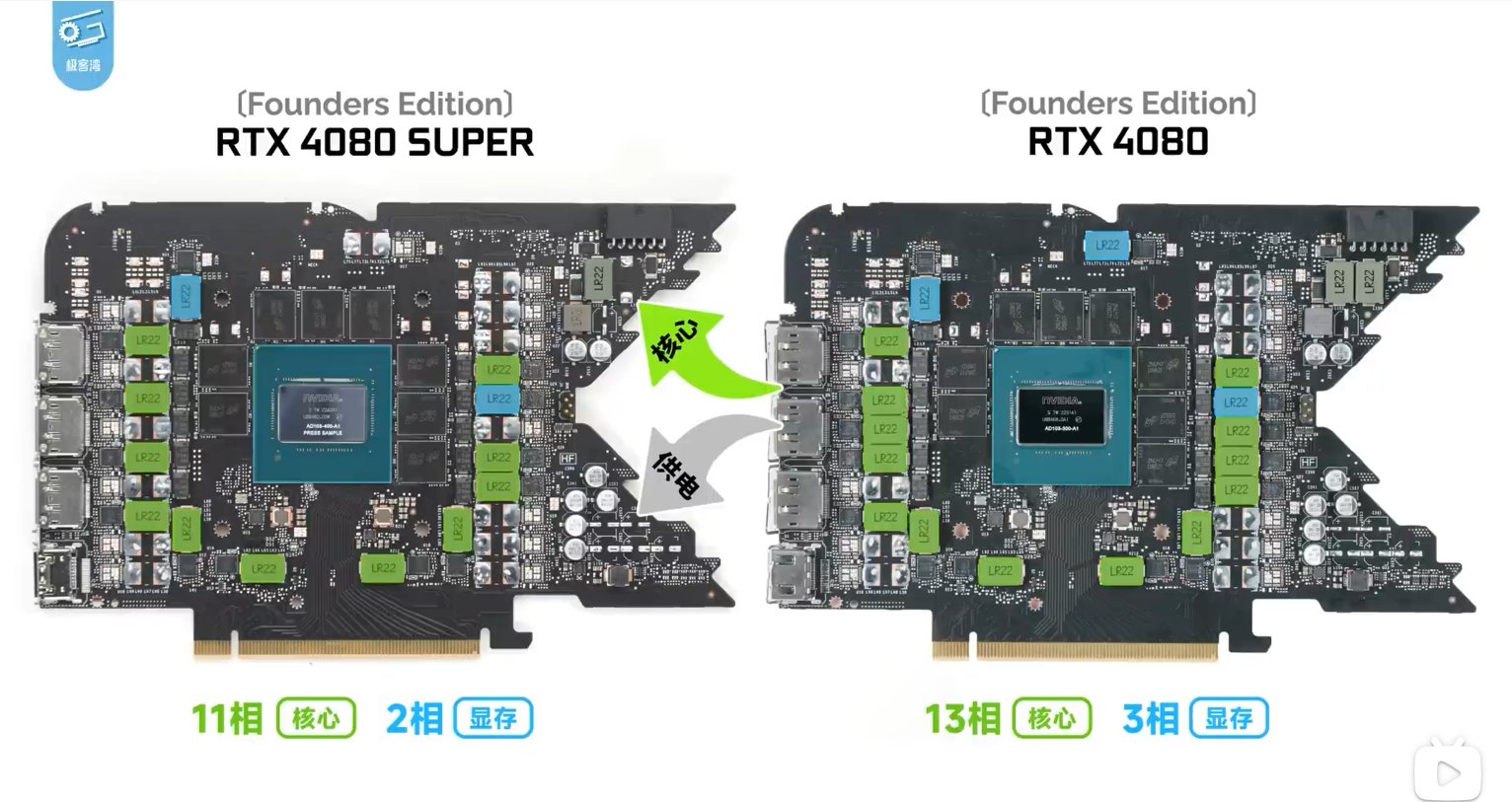Nvidia simplified the board design of its RTX 4080 Super Founders Edition
Lower MSRP requires lower costs.

Nvidia's GeForce RTX 4080 Super graphics cards has two significant differences compared to its non-Super predecessor: higher performance and a $200 lower recommended price. That's almost an unexpected combination in the current market for standalone desktops graphics, though it's also a tacit admission that the 4080 was originally priced too high. Apparently, there is a third difference as well: a simplified design of Nvidia's own GeForce RTX 4080 Super Founders Edition board.
Nvidia's GeForce RTX 4080 Founders Edition graphics card has a voltage regulating module featuring 13 power phases for its AD103 graphics processing unit, with three power phases for its 16GB of GDDR6X memory. By contrast, the new GeForce RTX 4080 Super Founders Edition board has an 11-phase VRM for the GPU and a 2-phase power supply circuitry for the memory, as noticed by reviewer Geekerwan (via @9550pro).
The slightly simplified printed circuit board (PCB) design does not really come as a surprise. On the one hand, by now Nvidia and TSMC have probably reduced performance variability of the AD103 graphics processor to a minimum and so Nvidia doesn't need to ensure the best possible power supply for the GPU — at least with 10,240 CUDA cores operating at up to 2,550 MHz — as virtually all chips will perform as advertised even with an 11+2 phase VRM.
Meanwhile, simplifying the GeForce RTX 4080 Super Founders Edition makes the product slightly cheaper to produce, so Nvidia can sell one of the best graphics cards on the market for $999 instead of $1,199 and retain its profit margin. The slight design optimization should not tangibly affect reliability of the product.
What remains to be seen is how well Nvidia's GeForce RTX 4080 Super Founders Edition graphics cards overclock. Advanced power supply circuitry tends to have a larger effect on overclockability, so the reduction in the number of phases may somewhat lower ability of the card to work at clocks beyond its official specifications — not that we noticed any issues in our review, where the average core clocks on the 4080 Super were quite high.
Nvidia also has plenty of partners offering custom GeForce RTX 4080 Super graphics cards that not only come factory overclocked, but also feature enhanced PCB designs and massive cooling systems to ensure additional overclocking potential. We'll be looking at some of these in the coming days.
Get Tom's Hardware's best news and in-depth reviews, straight to your inbox.

Anton Shilov is a contributing writer at Tom’s Hardware. Over the past couple of decades, he has covered everything from CPUs and GPUs to supercomputers and from modern process technologies and latest fab tools to high-tech industry trends.
-
pocketdrummer "Lower MSRP requires lower costs"Reply
No, it's still $200 too much even after the $200 cheaper version. And removing a couple of components that barely add cost in the first place isn't going to offset $200 per card. The problem is that they priced it OUTRAGEOUSLY HIGH in the first place, it's still an absurdly high price now, and it has nothing to do with board design. It's entirely due to nvidia price gouging RTX 40 series cards. -
35below0 No. Not outrageously too high. People *still* buy them. The market buys, so nVidia takes the money. They'd be foolish to offer lower prices when consumers are still willing to pay high prices.Reply
Yeah, i get that you're annoyed at this and that the price is huge. But you are ignoring the idiot saying shut up and take my money. Aka the consumer.
Every company that has huge overheads, depends heavily on R&D and is in such a market that is littered with dead bodies of previous high fliers and champions is going to charge as much as they can possibly get away with.
When was the last time someone bought a Creative Labs sound card?? or have you even seen an IBM pc? nVidia is here to rake in the cash today because they'll be dead tommorow.
If anything, the prices may be too low. High end gaming is a high-end luxury. Be grateful so many of us can afford it. -
bit_user Reply
Most people no longer buy sound cards, I think. It wasn't a case of the company faltering, but rather their market evaporating.35below0 said:When was the last time someone bought a Creative Labs sound card?? or have you even seen an IBM pc?
As for IBM, they made a strategic blunder by shifting to proprietary technologies, like the MCA bus. Dell and HP have shown you can be a big player in this business, without shunning all standards (although they dip a toe in the proprietary side of things too much, for my taste).
Anyway, IBM ended up selling their PC division to Lenovo, about 25 years ago. Since you can still buy Lenovo PCs, I'd say IBM's PC business still lives on...
I don't think the second part is necessary to justify the first. They see money on the table, so they're taking it.35below0 said:nVidia is here to rake in the cash today because they'll be dead tommorow.
I also don't see Nvidia profiteering as much as some claim. Costs are going up, across the board. New nodes are more expensive to design & manufacture. -
35below0 I don't disagree. In fact i agree that nVidia is not profiteering but is taking advantage of the position they're in.Reply
I also don't disagree about Creative Labs, but the fact their market evaporated does show how unreliable hardware can be.
That kind of business can be and usually is unstable. Compact Discs came and went within my lifetime. What was once an amazing breakthrough in sound quality and a leap forward, became a novelty coaster. Once a sign we're living in the future, now an unwated medium for sound storage. DVDs are an offshoot that lived on but soon enough people wont want them for their collections anymore.
In that period where CDs and CD players were a thing, companies had to spend on research and earn as much in return as possible. It looked for sure like the CD was here to stay but amazingly it went the way of the dinosaur. That's what i meant by "rake in the cash". It's not a pejorative. It's an imperative.
The cost of not earning enough in profits to cover losses, is going out of business. Of course this is obvious, but it is also repeatedly ignored.
Many of those who complain about prices of GPUs ignore how much it cost research and design them. Manufacture may be cheap but the logistics behind organizing that manufacture, and the shipping of resources in and products out is anything but. The brains who manage and organize it are not working for peanuts either. That's part of the cost too. -
bit_user Reply
You can still buy new CDs, but only for more mainstream artists. Unlike DVD, CD was never truly replaced with another physical media. Sure, there was a DVD-based format and SACD, but they never caught on, in the mainstream.35below0 said:Compact Discs came and went within my lifetime. What was once an amazing breakthrough in sound quality and a leap forward, became a novelty coaster. Once a sign we're living in the future, now an unwated medium for sound storage. DVDs are an offshoot that lived on but soon enough people wont want them for their collections anymore.
Software, software, software! People forget that most of Nvidia's R&D organization is comprised of software engineers. If we needed a reminder of just how crucial good drivers are, Intel's Alchemist debacle should've served that role.35below0 said:Many of those who complain about prices of GPUs ignore how much it cost research and design them.
It's crazy how people seem to think Nvidia and AMD should sell GPUs with like 10% or 15% margins, because that would leave almost nothing to fund the massive software efforts that make these chips sing.
